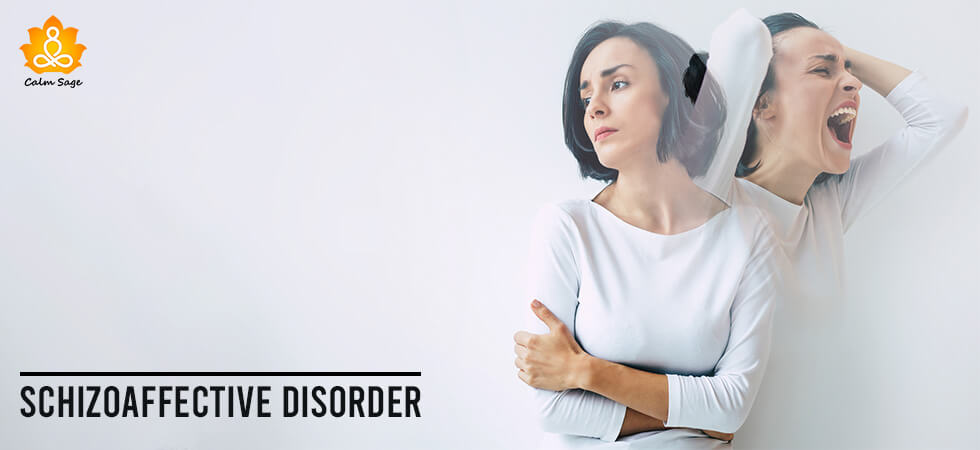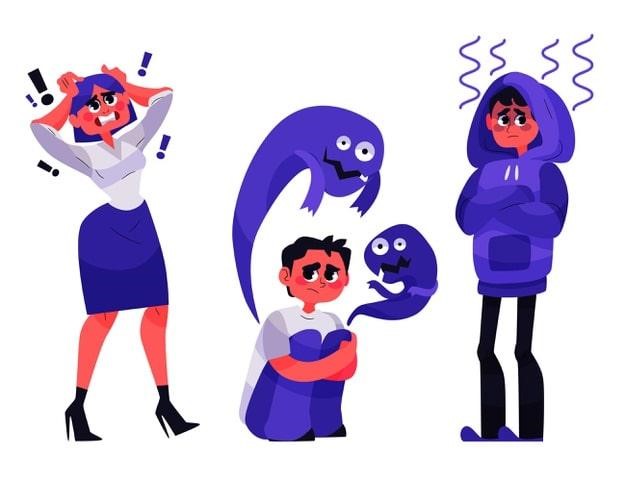Schizoaffective Disorder: Symptoms, Causes & Treatment

A chronic mental health condition, Schizoaffective disorder is an illness that is distinguished by the symptoms of schizophrenia and mood disorders such as depression and bipolar disorder. People who are diagnosed with this disorder are often misdiagnosed with bipolar disorder or schizophrenia as the symptoms of schizoaffective are very closely related to the two
In a study by the NCBI (National Center for Biotechnology Information), the lifetime prevalence of schizoaffective disorder was 0.32%.
People with the schizoaffective disorder often experience psychiatric and mood disorders. This disorder can be divided into two subtypes:
- Bipolar: manic episodes with or without depressive episodes
- Depressive: depressive episodes only
Schizoaffective disorder is a rare disorder, certainly rare than schizophrenia and other mood and personality disorders. Untreated schizoaffective disorder can lead to poor performance at work, at school, and withdrawal from social situations. This can lead to loneliness, low self-esteem, and poor concentration.
Symptoms Of Schizophrenia Disorder

The symptoms of schizophrenia disorders differ from person to person. Some people may experience psychotic symptoms (hallucinations and delusions) while some may experience depression and mania.
Symptoms to look out for are:
- Paranoia
- Delusions and hallucinations
- Confused and disorganized thinking
- Catatonia
- Irritability and depression
- Manic mood swings or hyperactivity
- Poor concentration skills
- Changes in appetite
- Thoughts of self-harm or suicide
- Changes in sleep pattern
- Withdrawal from social situations
If you or your loved one are showing symptoms of Schizoaffective disorder, it is recommended that you talk to a professional about your concerns. If you’re looking to connect with a professional, you can write to us at info@calmsage.com or visit our services page.
If you or someone you know are experiencing suicidal thoughts then immediately contact your local toll-free helpline number for assistance.
Causes Of Schizoaffective Disorder

There is no precise cause that can be linked with schizoaffective disorder but there are some factors that can contribute to the cause of this disorder:
- Genetic: If one or more of the family members – especially a parent or sibling – has or had schizoaffective disorder, schizophrenia, or bipolar disorder, then it is a likely possibility of you developing the disorder as well.
- Environmental Factors: Stressful events can also trigger the symptoms of schizoaffective disorder.
- Medication: Some medications can cause side-effects that may either cause a chemical imbalance in the brain or worsen the symptoms of schizoaffective disorder.
Note: People with schizoaffective disorder are more at risk of:
- Suicide, self-harm
- Social isolation
- Relationship conflicts
- Anxiety disorders
- Substance abuse or addiction
Schizoaffective Disorder Diagnosis
Schizoaffective disorder can be diagnosed by:
- Physical Evaluation: Test and scans can be done such as MRIs or CT scans that can help with the diagnosis.
- Psychiatric Evaluation: A doctor or a psychiatrist observes a person’s actions, behaviors, and thinking patterns to determine any potential symptoms of schizoaffective disorder. The doctor will use the diagnostic criteria from DSM-5. To be diagnosed with schizoaffective disorder, a person has to have:
- Delusions and hallucinations
- Confused and disorganized speech and thinking
- Catatonia
- Major mood episodes
Schizoaffective Disorder Treatment
1. Psychotherapy

There are two approaches to psychotherapy that can be employed in the treatment of schizoaffective disorder:
Individual Therapy: Talk therapy in an individual setting can help people with schizoaffective disorder. In therapy, people can learn more about their condition and what can be done to manage the symptoms. The sessions focus mainly on real-life scenarios and learning effective coping strategies.
Group Therapy: Some people are more comfortable in a group or family therapy setting. In group therapy, people get a chance to interact with others with the same condition and garner support. Group therapy can also help prevent social isolation and help a person learn social skills.
Disclaimer: As BetterHelp Affiliate, We may receive compensation from BetterHelp or other sources if you purchase products or services through the links provided on this page.
2. Medications
There are certain prescribed medications available for the treatment of schizoaffective disorder. Some of them are:
- Antipsychotics: To help manage symptoms like hallucinations and delusions.
- Mood Stabilizers: To help manage the symptoms of mania and depression.
- Antidepressants: To help manage symptoms of depression such as sadness, hopelessness, and insomnia.
Note: Please consult with a physician or a mental healthcare provider before taking any medications as some medications can have side-effects that can worsen your symptoms.
How To Support…

“Just because you don’t understand it doesn’t mean it isn’t so.” Lemony Snicket
The schizoaffective disorder requires regular treatment and support. If you or your loved one is affected by schizoaffective disorder, then you can support by:
- Learn about the disorder: Educating yourself and others about this disorder can help people seek the treatment they need. Spreading awareness can help remove the stigma surrounding psychotic conditions. Less knowledge about schizophrenia and related disorders can create myths that can prevent people from reaching out for help.
- Pay attention: If you notice your symptoms interfering with your daily activities, then consult a professional psychiatrist for help immediately. Asking for help can prevent the symptoms from getting worse.
- Support groups: Joining a support group and connecting with people with similar problems can help you understand more about this disorder and also help you understand how to help your loved ones.
- Avoid alcohols and drugs: Recreational drugs and alcohol can worsen the symptoms of schizoaffective disorder. Therefore, as much as possible, avoid such substances to prevent the worsening of the symptoms.
People with schizoaffective disorder can lead normal and healthy lives with the help of proper care and treatment. The important thing here is to understand the symptoms, the causes, getting the proper diagnosis, and getting the treatment best suited for you to help cope with this disorder.
Every condition and illness can be cured only if you reach out for help and get the treatment you need.
”Healing takes time, and asking for help is a courageous step.” Mariska Hargitay
You are strong! You are powerful!





















This is very helpful to me and i try to reach near a phychiatrist . Thank you.